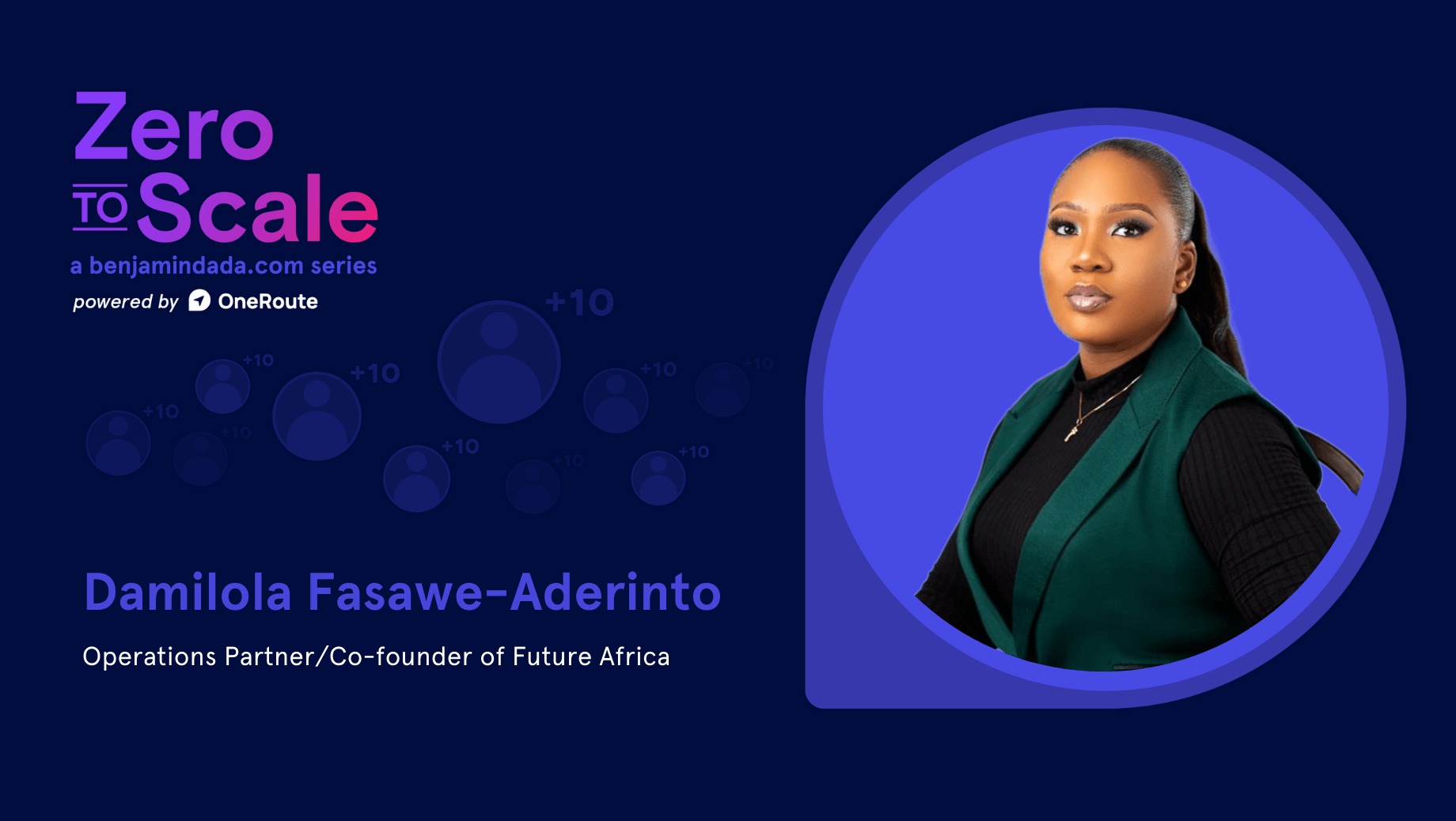Zero To Scale: Damilola Fasawe-Aderinto — Operations Partner and Co-founder of Future Africa
In this edition of Zero To Scale, Future Africa’s co-founder and operations partner Damilola Fasawe-Aderinto talks about how startups can attract investors and the growth levers African startups should focus on.

Zero To Scale (ZTS) is a web series that focuses on the journey of African founders and their startups from day zero until the day they achieve scale. ZTS is produced in partnership with OneRoute, an all-in-one tool for your customer communication needs.
The Fund for Africa’s Future, popularly known as Future Africa, connects investors to mission-driven startups turning Africa’s most difficult challenges into global business opportunities. In addition to capital, it also provides mission-driven innovators with coaching and community.
In this edition of Zero To Scale, Future Africa’s co-founder and operations partner Damilola Fasawe-Aderinto talks about how startups can attract investors and the growth levers African startups should focus on.
How did you become a co-founder and operations partner at Future Africa?
My entrepreneurial career started when I interned with Goldman Sachs’ operations division in 2013. It was my first foray into investment banking and operations.
I later joined Jumia, then it was known as Jumia Market. I built their operations department from a team of one person — only me — to a team of over 50 people. Then I moved on to Jumia Services, which is like the logistics arm of Jumia Group. Jumia Services provides logistics to all the other enterprises in the Group, especially Jumia Mall, which everybody knows as Jumia.
I worked with Jumia Services for about two years before I moved on to work with Iyin Aboyeji [while he was the CEO of Flutterwave] as a technical adviser and to manage his home office — personal investment business.
What’s the relationship between Street Capital and Future Africa?
Street Capital started as the family office for Fund I. The Fund I was set up for Iyin, Nadayar Enegesi [co-founder and CEO of Eden Life] and some of their friends to personally invest in companies. Street Capital was the family office set up to manage the fund and its operations.
Sometime in 2019, the general partners of Street Capital realised there is a bigger and better opportunity in plugging the funding gap for early-stage African startups. And that led to the launch of Future Africa.
How's the fundraising process of a VC firm different from that of startups?
Most times when startups fundraise, they are raising money to fund operations, including their tech stack, pay salaries and grow — improve their products and expand. Whereas, venture capital (VC) firms raise funds to invest in startups that are solving global or continental problems.
The business model of VC firms is also different from that of a startup. When startups raise funds, they don’t pay any management fees. All that’s required of them is to pay investors back with returns on their investment if that’s the case. And that’s a 50/50 chance, the startup can either do well or not. But when a VC firm raises money, the people they are raising money from — limited partners (LPs) — are charged a 2% management fee. The management fee is what VC firms use to run some of their operations. And when there’s an exit, the VC firm takes out 20% of the profit as a carry.
For example, investors drop $1 million in a VC fund. And the startup that the VC invested in was sold for $100 million. The VC firm would first deduct the capital ($1 million) from the $100 million and then deduct their 20% carry from the remaining $99 million. It’s the remaining $79.2 million that will be shared pro-rated among the LPs.
While startups raise money to build products and solve specific problems, VC firms raise money to solve multiple problems because VCs don’t invest in only one company.
Partner Content — OneRoute

How do VC firms pitch to or raise money from LPs?
LPs are wealthy individuals or institutions and they are looking for returns on investments (ROIs). But one thing to bear in mind is if you’re looking to get positive ROI for you [the VC firm] and your investors, you’ll be looking at businesses that have the potential to grow.
Also, there are different types of LPs. Some LPs are focused on investing in certain sectors such as insurtech and healthcare. And some LPs are diverse and not concerned about the sector the VC firm is pitching to them as long as the business has potential. So, it [how you pitch] depends on who you’re raising money from.
And some LPs put their trust in the performance of the VC firm, especially if the VC firm has a track record of having companies that perform very well in their portfolio.
What growth levers should African startups focus on?
People get into business for different reasons and there are different business models, sectors and investors. So I’ll generalise and not be specific. African startups should focus on activities that will improve their products, features and customer base. You should focus on improving your products and their features to bring more value to your customers. Because without customers, you can’t make money. If you really wanted to make an impact, then you’d have set up a charity organisation.
You should focus on revenue-generating ideas and business processes. Business processes are important because they give your business shape and structure. They enable you to holistically identify and resolve problems. And revenue-generating ideas are ideas that will bring money and not just fun and pretty ideas.
You should focus on recruiting and managing talents. How do you do this? Build a sustainable work environment with great culture and processes. People are not only looking for where to earn salaries. With the proliferation of startups, job opportunities are abundant. And remote work has made it easier. I can be in Nigeria and work with a company in San Francisco. So you need to keep your talent in a way that they are not looking to join a competitor offering a juicier deal. And not necessarily only about the salary. It includes other benefits and a good work environment.
Why do startups receive their funding in tranches rather than receiving the amount they raised at once?
I can’t speak for other VCs. But I’m aware some VC firms and investors do that. It’s all based on agreement. If the company agrees to it, then it’s okay for them. The investors that release money in tranches just want to be sure their money is being put to good use.
But at Future Africa, we’re focused on pre-seed and seed-stage companies and we don’t release funds in tranches or based on milestones. We keep to our commitment, at least for now. If we tell you we’re giving you $50,000, we give you your money at once. We don’t say when you achieve XYZ, we give X dollars from the $50,000. What we do after investing is to monitor your progress, see how we can help you grow and ensure the investment is well-spent.
What does a successful exit look like for African startups?
It depends on what the founding team sees as success. When MainOne was acquired for $320 million, people assume it was a small deal compared to the infrastructure and vast market. But if the founder deems it a success, then it is. Now, if your initial capital or what you’ve spent so far on the business is $2 million and you get acquired for $300 million, that’s a profit in your books. Ignore the outlook, you define what success is as the founding team.
Success could be an acquisition like Paystack or going public like Jumia. But it does not necessarily mean the business is profitable by the books. Success could also be building a sustainable product that’s causing a big change in the world like Flutterwave.
Although investors expect to get their money back and could consider the secondary sale as success, too.
What’s a good return on investment for African investors?
As long as it’s more than your initial capital, it’s good but not great. But then, most investors expect between 5x and 7x. That’s when you can say this was a fruitful investment because a lot of startup investors don’t make their money within the first year. So, if you have to wait for 4 to 10 years or 3 to 10 years, if you’re lucky, for the startup you invested in to make a profit or exit, you’re not expecting a 2x return on investment because that’ll be too small for you.
But the reality is different from projection. You can project, but the reality of the business is what’ll determine your profit.
How can African startups make themselves attractive to investors?
Generally, investors look at the problem you’re trying to solve. Is it global, how big is the problem and is it realistic? You can’t just come up with a problem that you deem fit. The problem-solving question guides the investors in looking at the market size. How many people are experiencing the problem you’re trying to solve and what’s the target market size? And this leads to traction. Investors expect that you have a growing customer base and some revenue. This would show that your business is viable and not just on paper. If your target market size makes sense, definitely your customer base, too, will make sense.
Also, investors look at the founding team. How knowledgeable and what kind of experience do they have? And if the founding is not as excellent as they expect, they expect the other team members to be good. That’s why people put advisers in their decks and the advisers have a wealth of experience.
Investors also consider the role of technology in the problem you’re trying to solve. Most investors nowadays are technology-driven. Because when technology is involved, it's easier for investors to track progress.
Lastly, growth appetite. Investors like to work with startups and founders that have a huge growth appetite. Founders who show drive and are ready to do anything to achieve their vision.
What are the actionable insights you can share with startups and investors?
For startups: Don’t just do what everyone is doing. There’ll be competition and things won’t be easy. But be focused, strategic, and have a plan. Also, ensure you’re retaining and managing your talents properly. Talent is very important; a great idea without a great team is as good as nothing.
For VCs: Move fast but be strategic about the move. Opportunities are limitless, you just have to find the right opportunity and plug into it.







Comments ()